How are you all trucking – wherever you are, in Australia or elsewhere in the world? Are you seeking cheerier books? Let me see what I can do this month.
As always, please check the end of this round-up for the latest awards news.
Awesome-ish August
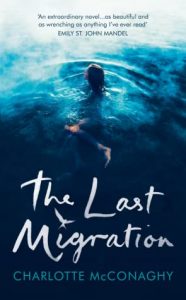 Our August stats are good overall, with 52 reviews posted – 8 more than July’s count, and one less than last August. Here are the highlights:
Our August stats are good overall, with 52 reviews posted – 8 more than July’s count, and one less than last August. Here are the highlights:
- Our most reviewed authors this month were the wonderful Thea Astley (4 reviews) followed closely by Charlotte McConaghy (3 reviews)
- Our most reviewed book was Charlotte McConaghy’s The last migration (3 reviews)
- Our top reviewers were the same GoodReads reviewers as last month: Georgia Rose with 7 reviews, and regular here, Cass Moriarty with 6.
The Classics
With no classics posted in June and one in July, we had a bumper crop in August due to ANZLitLovers’ Thea Astley Week in which some contributors here took part. Four books were tagged as Classic by our contributors and all were by Astley. While Drylands, published in 1999, is probably pushing our definition, the fact that Astley died only 5 years after that and that her oeuvre encompasses a few decades before that means that I’m happy to include this last book of hers as a classic!
The four books reviewed were Hunting the wild pineapple (1979) (Jennifer Cameron-Smith at GoodReads), An item from the late news (1982) (Whispering Gums), and Collected stories (1997) and Drylands (1999) (both by The Australian Legend).
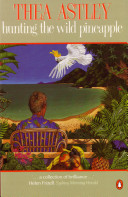 Jennifer hadn’t read Astley before but really liked Hunting the wild pineapple, which is a collection of linked short stories. She says:
Jennifer hadn’t read Astley before but really liked Hunting the wild pineapple, which is a collection of linked short stories. She says:
There’s a skill in constructing self-contained narratives as short stories: images are important, and language is critical. Each of the eight stories held my attention: none of them is predictable, each of them has a twist (or two) to make you catch your breath.
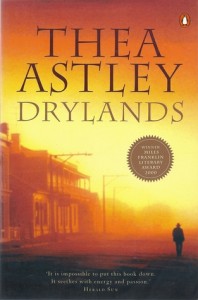 Bill (The Australian Legend) wrote a provocative commentary on one of the stories in Collected stories (linked above) and he wasn’t overly impressed with Drylands, saying:
Bill (The Australian Legend) wrote a provocative commentary on one of the stories in Collected stories (linked above) and he wasn’t overly impressed with Drylands, saying:
Drylands is a severely dysfunctional and dying town. I’m sure Astley intends it as a microcosm of all that is wrong with rural Queensland (although she fails to mention widespread illegal land clearing and water theft). What I suspect is that it is also a ‘microcosm’ of a bigger book. That she was too ambitious in what, at 70 years of age, she set out to do. And so we are left with an unsatisfactory framing device; characters who flit in and out with very little meat on their bones; a minimal plot – people get old, or tired, or worn down, and leave or die, Queensland men are bastards, the town dies.
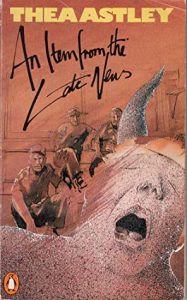 Have you read it? If so, we’d love to hear your thoughts. Meanwhile, I really liked my contribution, An item from the late news:
Have you read it? If so, we’d love to hear your thoughts. Meanwhile, I really liked my contribution, An item from the late news:
An item from the late news is quintessential Astley. It offers an unflinching look into the heart of small-minded Australia, and finds much to disturb us. And that is the value of reading literature like this.
If you’ve never read Astley, do consider trying her. She has important things to say and her writing is a treat.
Cheerier books?
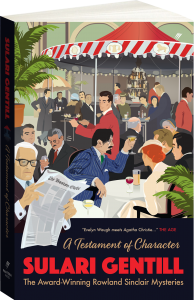 Unfortunately, you couldn’t accuse Thea Astley of being cheery – though she can be funny in a biting or satirical way. However, that’s not quite what I promised you here … so here goes.
Unfortunately, you couldn’t accuse Thea Astley of being cheery – though she can be funny in a biting or satirical way. However, that’s not quite what I promised you here … so here goes.
I know crime isn’t exactly cheerful, but Brona (Brona’s books), reviewing Sulari Gentill’s A testament of character (no. 10 in the Rowland Sinclair series), describes the series as “consistently written well constructed, endearing and historically accurate”. The word “endearing” suggests that this and other books in the series – all of which Brona describes at the end of her review – might be a good option for a bit of escapism.
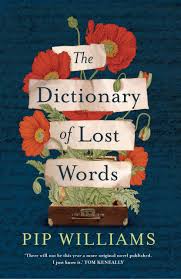 Pip Williams’ debut novel about the writing of the Oxford Dictionary, The dictionary of lost words, has been garnering many positive reviews since it was published earlier this year. Georgia Rose’s review is brief but she says the words I wanted to hear for this segment of my post:
Pip Williams’ debut novel about the writing of the Oxford Dictionary, The dictionary of lost words, has been garnering many positive reviews since it was published earlier this year. Georgia Rose’s review is brief but she says the words I wanted to hear for this segment of my post:
Overall, a beautiful, gentle book to escape into during these weird times.
Keeping with the words theme, but this time in a Young Adult novel (a genre which rarely appears in my roundups), is Fin J Ross’s cutely named Billings Better Bookstore and Brasserie. Two contributors reviewed it this month, Ashleigh Meikle (The Book Muse) and Jennifer Cameron-Smith (GoodReads), both greatly enjoying it. Jennifer called it a “word-feast” and concluded “A rewarding read. A read to return to. Really.”, while Ashleigh wrote that:
I loved this book, and would recommend it to all who love a good yarn, words and a story filled with hope,
So there, three options (or more if you look at the full Rowland Sinclair series) to escape into when Covid-19 becomes a bit too much!
Awards News
So many literary awards. Here are three more that made announcements relevant to Literary and Classics over the last month:
Western Australia Premier’s Literary Awards
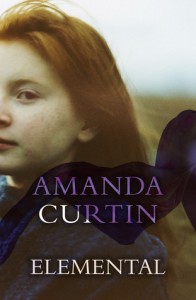 These now biennial awards are scaled down and have few categories (or winners this year) relevant to us here. However, it was great to see that Amanda Curtin was awarded the Western Australian Writer’s Fellowship. Curtin’s three novels, Elemental, Inherited and The sinkings, have been reviewed for the challenge. Use the Books Reviewed search on our menu bar to find them.
These now biennial awards are scaled down and have few categories (or winners this year) relevant to us here. However, it was great to see that Amanda Curtin was awarded the Western Australian Writer’s Fellowship. Curtin’s three novels, Elemental, Inherited and The sinkings, have been reviewed for the challenge. Use the Books Reviewed search on our menu bar to find them.
The Readings Prize for New Australian Fiction
All six books on the short list are by women:
- Joey Bui’s Lucky ticket
- Lauren Aimee Curtis’ Dolores
- Yumna Kassab’s The house of Youssef
- Laura Jean McKay’s The animals in that country
- Elizabeth Tan’s Smart ovens for lonely people
- Jessie Tu’s A lonely girl is a dangerous thing
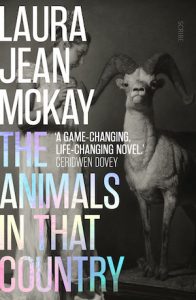 Three of these – by Curtis, Tan and Tu – have yet to be reviewed for the challenge. However, there were two reviews for McKay’s The animals in that country this month, by Georgia Rose and Cass Moriarty. Moriarty calls it “one of the most unusual literary novels you’ll ever read”. If you haven’t heard about this novel yet, it is set “in a recognisable world, but at the time of the appearance of an infectious contagion”. A main symptom is that infected people can understand the language of animals! While Moriarty has some reservations, she says that it “is a very good book – literary, great characterisation (particularly with Jean), a weird and engaging plot, and plenty of page-turning action.”
Three of these – by Curtis, Tan and Tu – have yet to be reviewed for the challenge. However, there were two reviews for McKay’s The animals in that country this month, by Georgia Rose and Cass Moriarty. Moriarty calls it “one of the most unusual literary novels you’ll ever read”. If you haven’t heard about this novel yet, it is set “in a recognisable world, but at the time of the appearance of an infectious contagion”. A main symptom is that infected people can understand the language of animals! While Moriarty has some reservations, she says that it “is a very good book – literary, great characterisation (particularly with Jean), a weird and engaging plot, and plenty of page-turning action.”
Queensland Literary Awards
The Queensland Literary Awards announced their winners. They have a swag of categories, so I’m focusing here on those most relevant to my Literary corner.
The University of Queensland Fiction Book Award: Mirandi Riwoe’s Stone sky gold mountain
The University of Queensland Non-Fiction Book Award: Helen Ennes’ Olive Cotton: A life in photography
University of Southern Queensland Steele Rudd Award for a Short Story Collection: Joey Bui’s Lucky ticket
David Unaipon Award for an Emerging Aboriginal and/or Torres Strait Islander Writer: Jazz Money’s The space between the paperbark (poetry)
Only Riwoe and Bui’s books have been reviewed for us to date (but not this month).
As always, if you are looking for ways to help the challenge, reading and reviewing books that aren’t yet included in our database is a good place to start.
Meanwhile, keep well and safe everyone – and do tell us how (or whether) reading is helping you manage these weird times.
———————
About Me
I am Whispering Gums and I read, review and blog about (mostly) literary fiction. It was reading Jane Austen when I was 14 years old that turned me on to reading literary fiction/classics, which is why I am here today doing this round-up! Little did Jane know what she started!
My love of Aussie literature started with Banjo Paterson’s ballads and Ethel Turner’s Seven Little Australians in my childhood. But, I didn’t really discover Australian women’s writing until the 1980s when I fell in love with Elizabeth Jolley, Thea Astley, Olga Masters, Helen Garner and Kate Grenville. Ever since then I have been included a good percentage of Australian (and other) women writers in my reading di





Great wrap up and congrats to the top reviewers.
Oh well now I have to put Astley on my list as well!